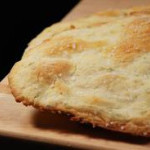Category: Food
Created by: dnatalia
Number of Blossarys: 60
 English (EN)
English (EN) English, UK (UE)
English, UK (UE) Romanian (RO)
Romanian (RO) Danish (DA)
Danish (DA) Turkish (TR)
Turkish (TR) French (FR)
French (FR) Swedish (SV)
Swedish (SV) Japanese (JA)
Japanese (JA)
Chapati, Chapatti, Chappati or Chapathi is an unleavened flatbread (also known as roti) from Nepal, Bangladesh, India and Pakistan.It is a common staple in South Asia as well as amongst South Asian expatriates throughout the world. Versions of the dish are also found in Central Asia and the Horn of Africa in countries such as Somalia but Somali flatbread is different from the Indian chapati and is more like a paratha, Kenya, Tanzania, and Uganda, with the laobing flatbread serving as a local variation in China. Chapati is known as sapati or doday in the Pashto language.\ And the different between Chapati and Naan is that, both Chapati and Naan breads are traditional Indian breads. Chapatis can be eaten at any meal of the day (often, at breakfast or snacktime, families eat them with jam or sugar). Naan is not eaten for breakfast, because it is much thicker/more filling. It is served with lunch or dinner. A naan is not eaten with sugar, jam, or fruit. It is eaten with a curry. (One exception is the Kabuli naan, which is prepared with dried fruits and nuts in it.) The main difference between a chapati and a naan is that a naan is leavened. (It is raised.) This means that the dough is prepared using yeast. This is what makes a naan fluffy. A chapati, on the other hand, is not leavened, which is why it is flat and not fluffy. For a chapati, you simply mix flour and water and roll it out and slap it on the ungreased tawa (hot griddle). You do not use yeast or baking powder to raise chapati dough and make it thick and fluffy. A chapati is therefore an unleavened quick bread. Naan is leavened and is baked in an oven.
Chapati, Chapatti, Chappati ou Chapathi est un pain plat sans levain (également connu sous le nom de roti) du Népal, Bangladesh, Inde et Pakistan.It est qu'un aliment de base commune en Asie du Sud, ainsi qu'entre l'Asie du Sud expatriés dans le monde entier. Versions du plat sont également disponibles en Asie centrale et la corne de l'Afrique dans des pays comme la Somalie mais somaliens pain plat diffère du chapati indien et ressemble plus à un paratha, Kenya, Tanzanie et Ouganda, avec la galette de laobing agissant comme une variation locale en Chine. Chapati est connu comme sapati ou doday en langue pachtou. Et les différents entre Chapati et Naan est que, les Chapati et Naan pains sont des pains indiens traditionnels. Chapatis peuvent être consommés à tous les repas de la journée (souvent, au petit déjeuner ou snacktime, familles mangent avec confiture ou sucre). Naan n'est pas mangé pour le petit déjeuner, parce que c'est beaucoup plus épais et plus remplissage. Il est servi avec déjeuner ou dîner. Un naan n'est pas mangé avec sucre, confiture ou fruit. Il est consommé avec un curry. (La seule exception est le naan Kabuli, qui est préparée avec des fruits secs et noix dedans.) La principale différence entre un chapati et un naan, c'est qu'un naan retranchée. (Il se déclenche). Cela signifie que la pâte est préparée à l'aide de la levure. C'est ce qui rend un naan moelleux. Un chapati, quant à elle, pas retranchée, c'est pourquoi il est plat et pas moelleux. Pour un chapati, vous simplement Mélangez la farine et l'eau et roulez il et il tape sur la tawa non graissée (plaque de cuisson chaude). Vous n'utilisez pas de levure ou poudre à pâte pour soulever la pâte chapati et le rendre épais et moelleux. Un chapati est donc un levain rapide. Naan retranchée et est cuit dans un four.
By: dnatalia

